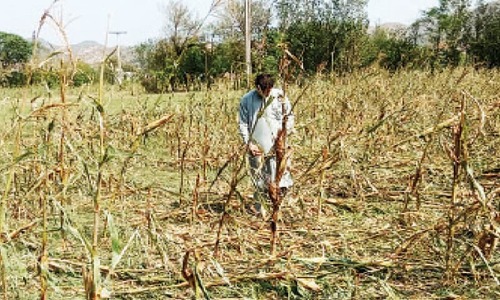HYDERABAD: The Sindh Abadgar Board (SAB) has sought 50 per cent fertiliser subsidy for upcoming rabi and kharif crops, claiming that recent monsoon rains and flash floods had destroyed almost 70pc of kharif crops in Sindh which was ready to be harvested and inflicted estimated loss of Rs350 billion to farmers, livestock farm owners.
Speaking at a press conference in Hyderabad on Tuesday, SAB leaders feared wheat’s acreage would not be achieved while Sindh missed the procurement target this year; therefore, lesser acreage again means lesser procurement next year as well.
They asked the government to start acting instead of issuing statements and called for closing all breaches made in different canals in Qambar Shahdadkot area, which they said had affected three-quarters of the one million acres of agricultural land.
They said alms, relief assistance or BISP handouts would not work for farmers and they should be given oilseed crops’ seed to enable them to earn a livelihood. They regretted that lessons had not been learnt
and water infrastructure was not augmented after the 2011 floods.
They said 70pc of kharif crop, ready to be harvested, was destroyed and cotton, dates, onions, tomatoes other vegetables were over 90pc washed away in July and August. They said livestock was also impacted due to the unavailability of fodder and diseases.
Due to rains and flash floods, property, houses, road networks and infrastructure worth billions of rupees were severely damaged in both rural and urban areas, SAB representatives said.
They demanded that the dewatering plan be devised on an emergency basis to drain rainwater from residential areas and agricultural fields.
Small farmers, they said, should be provided fuel so that they could dewater their fields to ensure the cultivation of upcoming crops.
They asked the government to take immediate measures for plugging broken dykes and canals while livestock farmers should also be provided fixed compensations for their damages.
The SAB leaders also demanded that a permanent and fixed climate change fund should be created, which could be used in any emergency situation.
The impact of losses on the urban economy would
be visible with lack of raw material, higher imports of food products, lack of demand for fertilisers, motorbikes, etc, they said and emphasised that the earlier agricultural activity started, the better for people or economy.
They demanded a 50pc subsidy for rabi 2022
and kharif 2023 on fertilisers, withdrawal of fuel adjustment charges on electricity, refund of collected charges to farmers, interest-free loans through one-window operations, waiver of agricultural loans, free seeds for wheat, sunflower, cotton and other fodders to small farmers.
Published in Dawn, October 5th, 2022











































